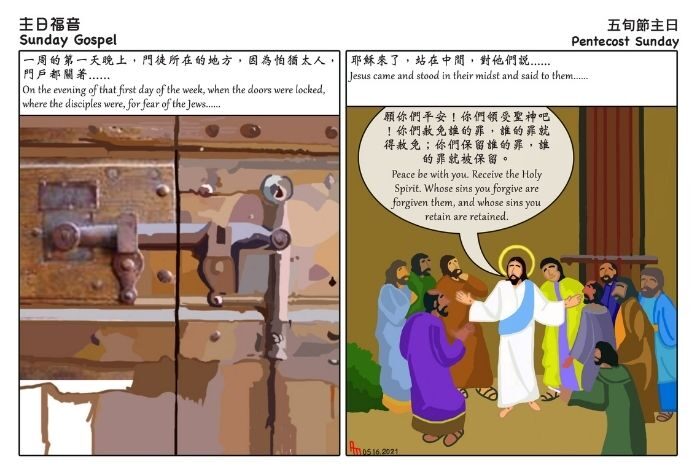Jijo Kandamkulathy CMF
Claretian Publications, Macau
23 May 2021 – Solemnity of Pentecost – Year B (Jn 20:19-23)
The narration of the outpouring of the Holy Spirit is found very vividly in the Acts of the Apostles. The narration of the tongues of fire, the thunder, and the wind creates a dramatic background of Pentecost. The central phenomenon is the new found ability of the timid and scared apostles to confidently speak to a large crowd of varied languages, to understand them in their own familiar languages. The message of their preaching is the ascension mandate, repentance and forgiveness through the risen Christ.
The message transcends the chaos of many languages of the gathered crowd and everyone gets the message without confusion. The Old Testament narrative of the tower of Babel (Gen 11: 1-9) is important to recall here. The project to defy God is represented by the tower of Babel. During the Pentecost event, God gathers back His people scattered in the Babel project and begins the reconstruction of humanity by a unifying them in a language of repentance and forgiveness under the guidance of the Holy Spirit.
The miracle is not about the ability of people to understand a language. It is the ability of people to understand one another. One of the foundational human tragedies is failing to understand others as one’s brothers, sisters and neighbours. Its antidote is to develop a spirituality of understanding one another. It is this understanding that can bring all humans together.
There was an attempt to begin a language called Esperanza. After nearly 100 years of promotion, only about two hundred thousand people are speaking the language now. The idea was, that it would be easier for international communities to understand each other if they had one language. The language failed to capture the imagination of people because the disruption and chaos in the world are not about language but about a quality of the mind to understand others. It is this understanding that, the Pentecost inaugurated.
The gospel passage we read today from John, describes the outpouring of the Spirit immediately after the resurrection. After he breathes his Spirit into them, Jesus empowers them, “whose sins you forgive, will be forgiven and whose sins you retain will be retained.” This passage is often misinterpreted as allowing a certain discretionary power to the disciples to cast people into the status of sin. The text has to be interpreted as the continuation of the topic of forgiveness that Jesus speaks. These are the disciples who have learned from Jesus to forgive without limits. He taught them, if you do not forgive others their sins, you will block your own forgiveness from God the Father. The invitation to the disciples is not to let any sin remain without being forgiven, rather to reach the whole world and forgive their sins. The hidden message there is, if you cannot reach out to the last person in the world to forgive sins, this person lives in the pain of sinfulness. Forgiveness of sins is to be understood as an essential part of baptizing.
A forgiven sin loses its sting to hurt the one who is wronged and the one who does wrong. The key to annihilate sin is forgiveness.


 Follow
Follow


